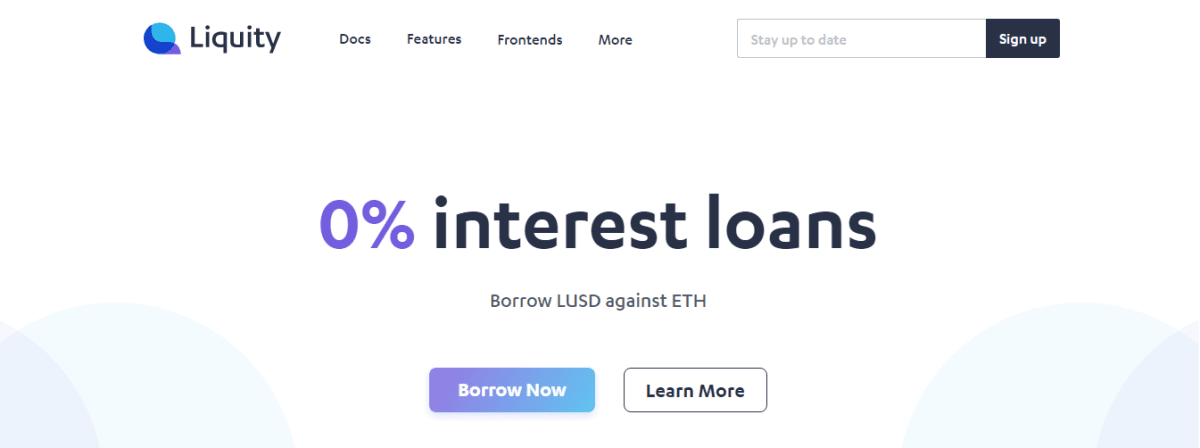Liquity USD (LUSD): A DeFi Stablecoin Review

Liquity USD, or LUSD, is a stablecoin that maintains a 1:1 peg with the US dollar. It's used by the Liquity lending protocol as the primary asset for issuing loans backed by Ethereum (ETH). When LUSD is repaid, the loan is resolved, and the ETH collateral is returned to the owner at its nominal value.

The Liquity network is a DeFi blockchain platform that offers loans in the LUSD stablecoin, secured by ETH. Essentially, Liquity functions as a decentralized lending system, enabling borrowers to secure a loan in LUSD at a 0% interest rate, with ETH serving as collateral. LUSD is allocated based on the collateral amount with a 110% ratio.
In the Liquity network, no extra fees are charged; all operations are performed by an algorithm instead of miners, as is the case with PoW networks. As such, these operations are entirely automated and not dependent on validators. Liquity's lending protocol, a standard DeFi product, is also a fully decentralized solution not governed by any particular individual or group.

LUSD is the native stablecoin of the Liquity lending protocol, providing 0% interest lending. Source: liquity.org
Besides lending, Liquity allows users to deposit LUSD tokens into 'stability pools' to earn rewards in ETH and LQTY tokens. These 'stability pools' operate similarly to liquidity pools in traditional PoS networks.
Incentives for Stability Providers
Profit from liquidation: Typically, liquidation offers a net profit to stability pool participants, derived from the difference between the loan amount issued (in LUSD) and the collateral received (in ETH). Stability providers, contributing proportionally to their holdings, get collateral from liquidated positions at a substantial discount.
Rewards: Stability providers consistently receive rewards in LQTY tokens in relation to the total amount of LUSD deposited. Early adopters of the pool earn higher rewards for their participation. However, as the liquidity pool becomes saturated, the reward amount starts to decline progressively.
Stability providers can retrieve their assets at any moment, given they haven't been used for debt repayment.
Apart from generating income through stability provision, LUSD also allows for earning through traditional LQTY staking. This requires exchanging LUSD for LQTY at the prevailing exchange rate and setting a term for asset lock-up.
The Creators of Liquity USD
Robert Lauko and Rick Pardoe are the masterminds behind the Liquity USD token.
Robert Lauko, a co-founder and the Head of Research at Liquity, has a wealth of experience in traditional finance companies (TradeFI). He focuses on algorithm research, network monitoring, and solving network scalability problems.
Rick Pardoe, another co-founder, serves as the lead engineer at Liquity. He holds degrees in physics and economics.
Michael Svoboda, the CEO of Liquity, previously held roles as the CEO and Chief Operating Officer (COO) in various blockchain companies. He possesses a Master's degree in computer science and economics.
LUSD Token
LUSD is an ERC-20 token, created on the Ethereum network, which has recently adopted the Proof-of-Stake (PoS) consensus algorithm.
Based on the outlined emission distribution model, a significant fraction of the tokens were allocated to support stability pools. Earning rewards in LUSD is possible only by making deposits into these pools. Furthermore, 33.9% of the total supply was allocated towards fostering the growth of the protocol's ecosystem. Another 6.1% were rewarded to the development team and advisors, while investors received 1%. A certain portion of the LUSD token emission was also channeled into the Liquity AG Endowment fund, as well as earmarked for service providers.
Currently, there are nearly 282 million LUSD in circulation. With a market capitalization of $282 million, LUSD token holds the 220th spot in the CoinMarketCap ranking.
LUSD can be obtained on DEX exchanges such as Uniswap, as well as through similar decentralized protocols like Curve Finance, Balancer, and the Maverick Protocol among others. LUSD is also accessible on certain CEX exchanges, including Gemini for instance.

